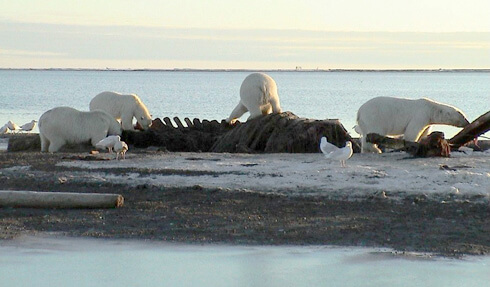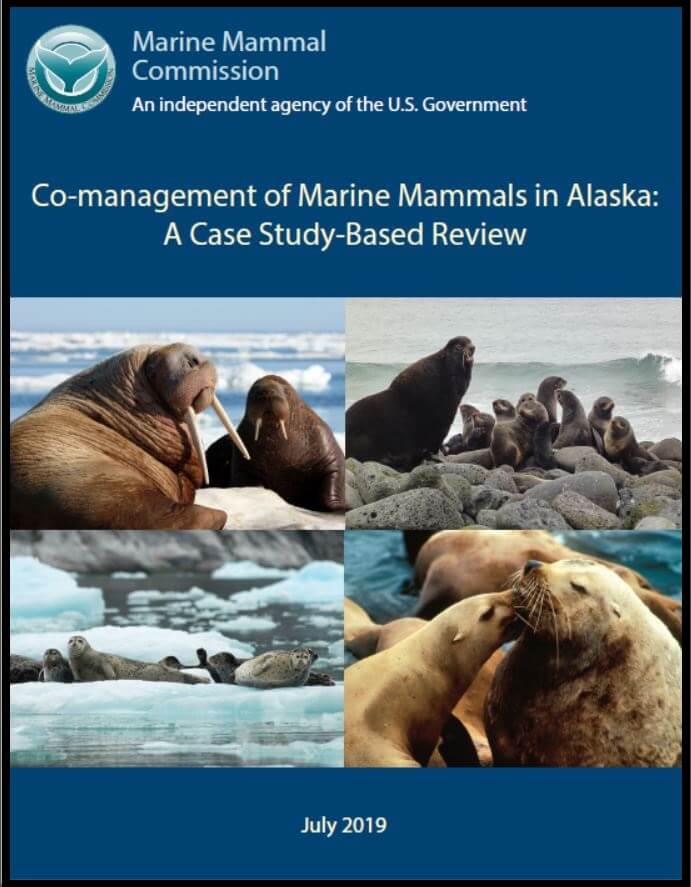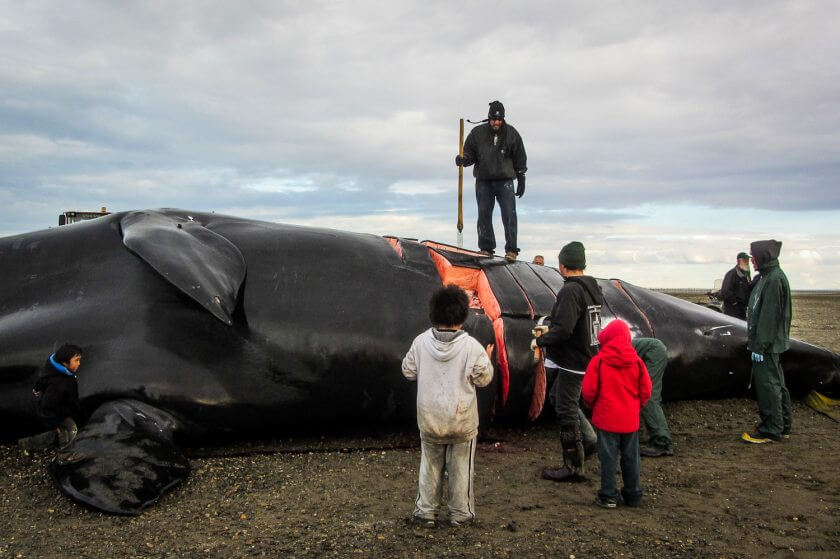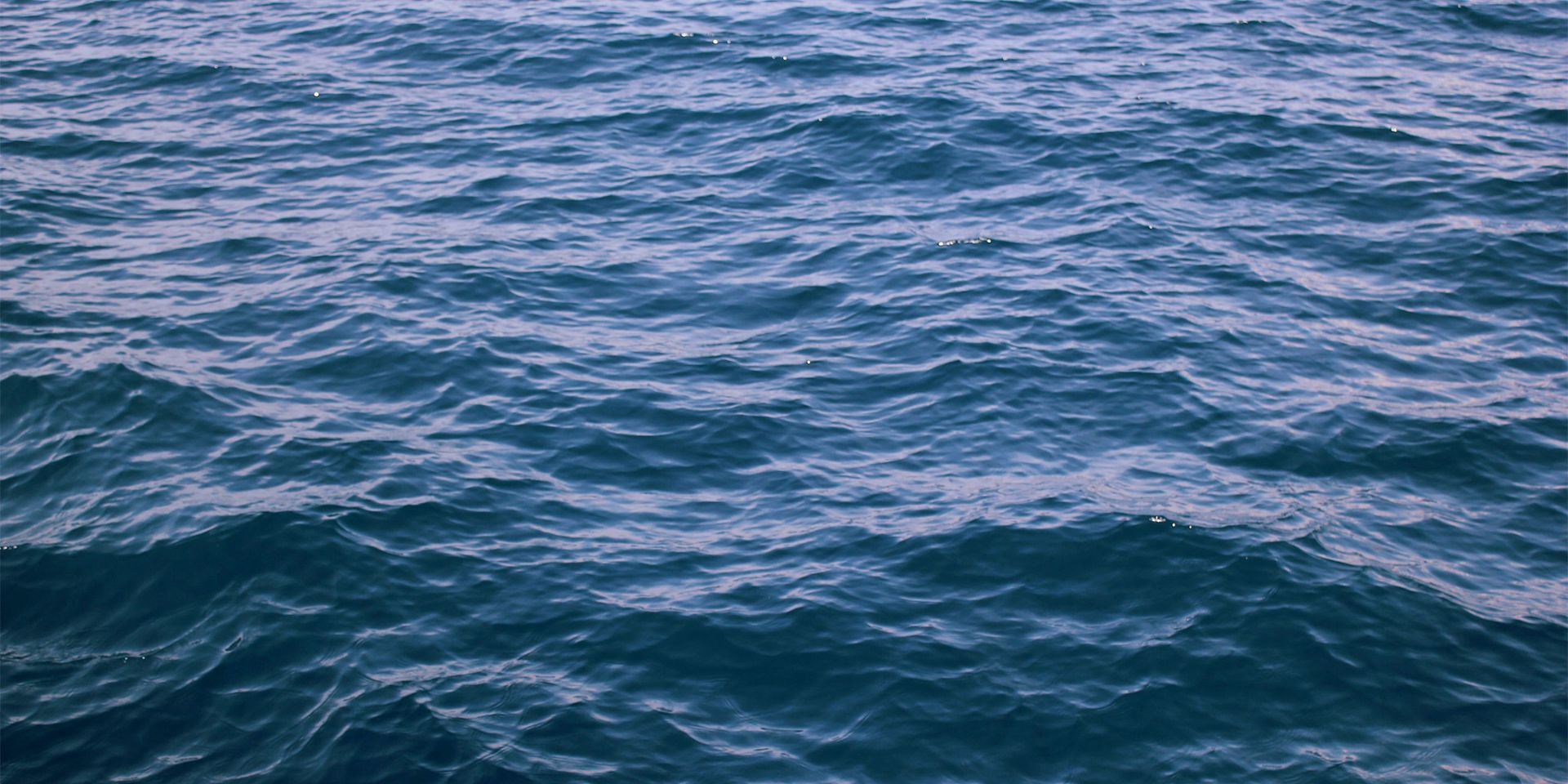Co-Management and Alaska Native Tribal Consultation
Marine mammals have long been essential to Alaska Native subsistence, culture and way of life. Recognizing this, Congress included an Alaska Native Exemption in the Marine Mammal Protection Act (MMPA) that allows Alaska Natives to take marine mammals for subsistence purposes and for creating and selling authentic native articles of handicrafts and clothing, provided that the take is not accomplished in a wasteful manner.
The 1994 amendments to the MMPA included Section 119 to allow the Secretaries of Commerce and the Interior to “enter into cooperative agreements with Alaska Native organizations to conserve marine mammals and provide co-management of subsistence use by Alaska Natives.” Implicit in Section 119 is the belief that cooperative efforts to manage subsistence harvests that incorporate the knowledge, skills, and perspectives of Alaska Natives are more likely to achieve the goals of the MMPA than is management by the federal agencies alone.

Polar bears feed on unused portions of whale carcasses that are deposited at a “bone pile” at Barter Island, near Kaktovik, during the subsistence whale harvest season. (FWS)
Agreements “may include grants to Alaska Native Organizations for, among other purposes,
- collecting and analyzing data on marine mammal populations;
- monitoring the harvest of marine mammals for subsistence use;
- participating in marine mammal research conducted by the federal government, states, academic institutions, and private organizations; and
- developing marine mammal co-management structures with federal and state agencies.”
ANOs with Co-Management Agreements with NMFS
Alaska Eskimo Whaling Commission – bowhead whales
Alaska Beluga Whale Committee – Western Alaska beluga whales (Eastern Bering Sea, Eastern Chukchi Sea, and Beaufort Sea stocks)
Aleut Community of St. Paul Island – Steller sea lions and northern fur seals
Aleut Community of St. George Island – Steller sea lions and northern fur seals
Aleut Marine Mammal Commission – all marine mammal species with particular focus on Steller sea lions and harbor seals
Ice Seal Committee – Alaskan ice seals (including ringed, spotted, bearded, and ribbon seals)
Indigenous People’s Council for Marine Mammals (IPCoMM) – “umbrella” organization that brings together representatives from other ANOs to address issues of common interest
ANOs with Cooperative Agreements with FWS
Alaska Nannut Co-management Council – polar bears (in process of establishing a cooperative agreement with FWS as the successor organization to Alaska Nanuuq Commission, which is no longer active)
Eskimo Walrus Commission – Pacific walruses
Since 1994, the National Marine Fisheries Service (NMFS) and the U.S. Fish and Wildlife Service (FWS) have entered into agreements with several Alaska Native Organizations (ANOs) involving 11 marine mammal species (see links at right). ANOs are authorized by Tribal leadership to enter into specific co-management or cooperative agreements. The agreements vary in content by species, region, and agency but generally describe harvest monitoring methods; collaboration on research, education, and outreach projects; required funding; means to resolve conflicts; and procedures for terminating the agreement.
In 1997, NMFS and FWS entered into an “umbrella agreement” with the Indigenous People’s Council for Marine Mammals (IPCoMM), which was revised in 2006. The umbrella agreement provides a foundation and a direction for developing co-management agreements between ANOs and federal agencies. IPCoMM was given the authority to enter into this umbrella agreement by authorizing resolutions from the Alaska Federation of Natives and those Tribally authorized ANOs that are members of IPCoMM.
Co-management efforts have integrated the field skills and Indigenous Knowledge of Alaska Native hunters and subsistence users with the scientific and technological expertise of scientists to enhance understanding of marine mammals in Alaska, including their stock structure, status, trends, movement and habitat-use patterns, responses to climate change, animal health and condition, contaminants, and disease. Sampling of Native-harvested animals for scientific purposes (often referred to as biosampling) has provided marine mammal tissues for a variety of studies. Education and outreach efforts co-led by experienced hunters and resource managers reinforce sustainable hunting practices, and familiarize Alaska Native youth with cultural and subsistence traditions. Such efforts contribute significantly to marine mammal conservation and the maintenance of subsistence cultures.
What the Commission Is Doing
Strengthening Co-Management
In February 2008, the Commission held a meeting in Anchorage, Alaska, to review co-management, to assess progress of cooperative agreements in conserving marine mammals and providing co-management of subsistence use by Alaska Natives, and to identify ways forward. For more information, see the report Review of Co-Management Efforts in Alaska.
Following up on the Commission’s 2008 review, the Commission undertook a more in-depth review of marine mammal co-management, as recommended by IPCoMM at its 2016 Board meeting. The objectives of the review were to identify essential components and key impediments to effective co-management of marine mammals in Alaska. The overall goal of the review was to strengthen co-management relationships between ANOs and federal partners to improve the conservation of marine mammals in a region where marine mammals provide food security for Alaska Natives and are also of critical ecological, social, and economic importance. The review was funded by the North Pacific Research Board and was conducted in 2018. The review was guided by a Steering Committee of Alaska Natives and federal resource managers from NMFS and FWS, using a “case-study” approach focused on three ANOs — the Eskimo Walrus Commission, the Aleut Marine Mammal Commission, and the Aleut Community of St. Paul Island. More information about the review and its findings can be found on the Co-Management Review Project webpage.
also of critical ecological, social, and economic importance. The review was funded by the North Pacific Research Board and was conducted in 2018. The review was guided by a Steering Committee of Alaska Natives and federal resource managers from NMFS and FWS, using a “case-study” approach focused on three ANOs — the Eskimo Walrus Commission, the Aleut Marine Mammal Commission, and the Aleut Community of St. Paul Island. More information about the review and its findings can be found on the Co-Management Review Project webpage.
Check out the final report for the Co-management of Marine Mammals in Alaska: A Case Study-Based Review
The Commission attends co-management meetings and works to facilitate further discussions with federal agencies, ANOs, and communities, as appropriate, regarding how the findings and recommendations from the 2018 review, in addition to other efforts, can be used to continue to enhance co-management and conservation of marine mammals in Alaska.
The Commission supports increased opportunities for Alaska Native participation in marine mammal research and management activities. The Commission’s Grants and Research Program serves as one mechanism to support co-production of science knowledge used in co-management, funding projects that have incorporated Indigenous Knowledge and collaborated with co-management partners to advance the conservation and protection goals of the MMPA. Additionally, the Commission continues to explore ways to engage new generations of Alaska Natives and federal agency staff in co-management activities. For example, the Commission has recently partnered with Alaska Sea Grant’s Community-Engaged Undergraduate Internship Program to sponsor internships with ANOs, providing leadership opportunities and fostering future co-management leaders.

Kaktovik residents harvesting a 44′ bowhead whale in September 2012 (Dania Moss)
Enhancing the Tribal Consultation Process
The 20-year history of co-management of marine mammals between federal agencies and Alaska Native organizations prompted the Commission to ask whether lessons learned from successful co-management activities could enhance the federal government-to-Tribal government consultation process in Alaska.
Executive Order 13175 directs federal agencies to consult with American Indian and Alaska Native tribes on policies, regulations, legislation, and other actions that may have Tribal implications. This includes actions affecting not only marine mammals but also all other tribal resources (natural, cultural, and socioeconomic). The Commission believes that the existing tribal consultation processes in Alaska could be strengthened to ensure meaningful, timely, and coordinated input by Alaska Native communities on issues involving marine mammals and their availability for subsistence.
In December 2012, the Commission, in collaboration with IPCoMM and the Environmental Law Institute (ELI), convened a meeting to review and seek ways to improve the Tribal consultation process. Participants included representatives of various federal agencies, ANOs, other Alaska Native Tribal members, and public and private stakeholders. Several meeting participants suggested that Alaska Native communities should develop guidance on how the tribes themselves would like federal agencies to conduct consultations related to actions that may affect marine mammals. For more information, see the summary of the Commission meeting on Consultation and Co-Management.
In October 2014, the Commission contracted with ELI to work with IPCoMM, ANOs, and others to develop model procedures for government-to-government consultations with Alaska Native tribes under Executive Order 13175 and related directives. The objective of the project was to assist Alaska Native communities in the development of model consultation procedures regarding policies, regulations, legislation, or other federal actions that have Tribal implications. The model consultation procedures would draw from the experiences and lessons learned from marine mammal co-management and cooperative agreements to improve and strengthen consultations involving Alaska Natives. ELI convened an advisory group with expertise in marine mammal consultation and co-management to help guide the project, with assistance from IPCoMM. The draft procedures were reviewed by Alaska Natives and several federal agencies. ELI issued a final handbook outlining model consultation procedures in January 2016.
The Commission’s Tribal Consultation Action Plan
In response to a 26 January 2021 Presidential Memorandum on Tribal Consultation and Strengthening Nation-to-Nation Relationships, the Commission reviewed and updated its 2010 Action Plan for the Implementation of Executive Order 13175 regarding Consultation and Coordination with Tribal Governments. The Commission developed its original action plan in 2010 pursuant to President Obama’s 5 November 2009 Presidential Memorandum Concerning Tribal Consultation under the Executive Order. The Commission coordinated its review of the plan in Alaska through IPCoMM. The Commission’s Chairman and Alaska Native Liaison participated in IPCoMM’s 15-16 July 2021 Board of Director’s meeting, at which they gave a presentation and received comments on the revised action plan. Subsequent to that meeting, the Commission sent the plan for comment to all 14 Tribally authorized ANOs and Native villages that are members of IPCoMM and separately to two other Tribal villages at the request of ANOs. In addition, the Commission sent the plan to other ANOs and regional organizations that, although not Tribal entities, represent Alaska Natives on marine mammal issues. In all, the Commission sent the plan to 22 ANOs, Alaska Tribal villages, and Alaska regional organizations for review and comment.
The Commission also sent the action plan to the Makah Tribe in Washington, whose treaty specifically reserves hunting rights for marine mammals. The Commission’s three Commissioners and senior staff met with the Makah Tribe to discuss provisions of the action plan and ways in which it could be strengthened to address the Tribe’s concerns. Although the Commission’s action plan provides for consulting with other treaty Tribes in appropriate situations, the Makah Tribe is the only one that is covered explicitly in the Commission’s action plan.
Based on comments received from the Tribes and ANOs, the Commission made several changes to clarify certain elements of the action plan. The Commission submitted its revised action plan to the Office of Management and Budget in November 2021. A copy of the revised action plan is available here.
